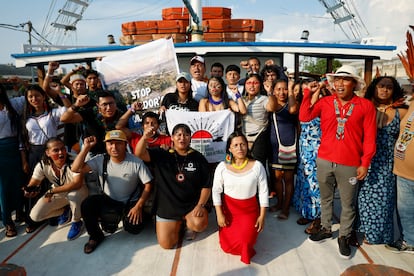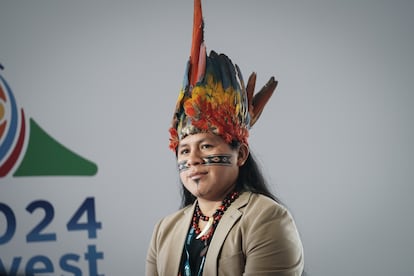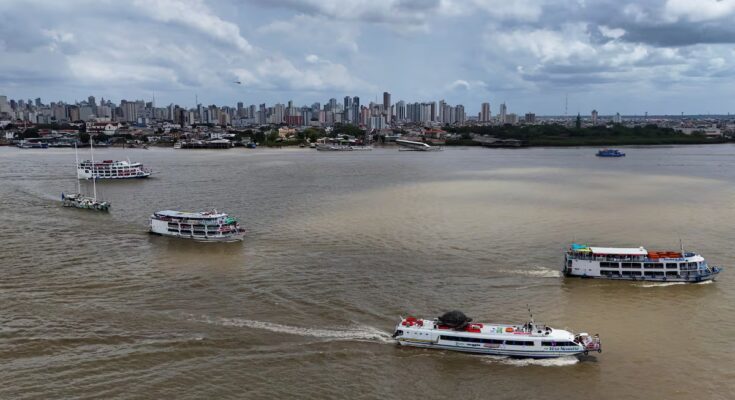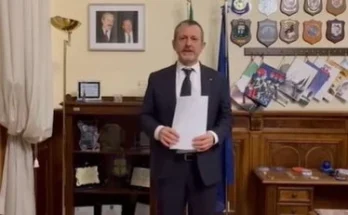EL PAÍS openly offers the América Futura column for its daily and global informative contribution on sustainable development. If you want to support our journalism, subscribe Here.
A line of people waited at the top of Yarina Island, Peru, for the arrival of the Amazon flotilla. From the boat they were seen as a small line. But as they got closer, the messages they contained made more and more sense. “Fair and binding energy transition”; “without racial justice there is no climate justice”; and “energy transition plans must respect the rights and territories of indigenous populations,” read the signs held up by adults and children of this Kichwa community. The words reflect the demands that the indigenous flotilla that sailed the Amazon wanted to lead to its destination: the United Nations Conference of the Parties on Climate Change (COP30).
The call for a just energy transition, which is a major focus of this year’s negotiations, has been part of conversations at every stop on indigenous leaders’ more than 3,000-kilometer journey from Ecuador to Brazil. This Sunday, upon their arrival in Belém to participate in the negotiations, the more than 70 representatives of the Amazon basin reiterated their intention: “The Amazon is not a resource to be exploited.” This is what Leo Cerda, leader of the Kichwa and one of the spokespersons of the flotilla, said in front of the media who came to welcome them. “We cannot talk about a fair energy transition while new sacrificial zones are opening up in our territories,” he added.
Two years after the need to transition away from fossil fuels was recognized in the first global assessment, which assessed progress on the Paris Agreement, and after countries committed to tripling their renewable energy capacity by 2030, there are still no concrete actions to reduce or eliminate oil dependence in the region. Added to this is the extraction of so-called transition minerals and the expansion of renewable energy projects, in many cases, without the prior consent of affected communities.
Transition with fossils
“What we are witnessing today is not a transition, but an energy expansion. We talk about clean energy, but at the same time we extract more oil, open new mines with transition minerals and impose renewable megaprojects without consensus. The conversation changes, but the structure does not change”, explains Nadino Calapucha, president of Tu Amazonía and one of the Kichwa representatives who traveled in the flotilla.
During the trip, Calapucha was one of those responsible for promoting activities to reflect on the true meaning of this transition for indigenous peoples and now, already in Belém, he will participate in events on the climate crisis and the expansion of the oil frontier, especially in Ecuador.
In this country, the opening of two oil rounds starting from the end of 2025 in the Amazon has been announced. The first is the Subandina and the second is the Suroriente, where previous governments have already tried to open it in the past without success. According to the organization Amazon Frontlines, these affect more than 3.5 million hectares of jungle. COP30 also coincides with Ecuador’s Popular Consultation, which includes a question on establishing a Constituent Assembly to draft a new Constitution.
According to María Daniela Conde, deputy minister of Hydrocarbons, during the XX Annual Meeting of Oil and Gas, with this Constituent Assembly there will not be “a new law on hydrocarbons, but rather a framework of the Constitution that allows an adequate investment and efficiency strategy” for the oil sector. This question was one of the concerns of the flotilla throughout the voyage.
Ecuador’s intentions are not an isolated event in the region. While Calapucha was giving a seminar on the role that oil disposal will play in COP30, during the flotilla tour, the Brazilian delegation was informed that its government had authorized the exploitation of oil at the mouth of the Amazon. A recent study by Earth Insight reveals that 31 million hectares of indigenous and local community territories in the Amazon overlap with oil and gas blocks.

Although the COP28 Global Review recognized the need to move away from fossils to stop the planet’s temperature rising, the new climate commitments, known as Nationally Determined Contributions (NDCs), do not yet mention how they will accomplish this process. In the case of Ecuador, for example, eliminating or reducing dependence on oil is not mentioned in its strategies.
“It has been difficult to include this issue in the region’s NDCs because many of our economies depend on everything behind fossil fuels,” explains Andrés Mogro, programmatic coordinator of the Water and Climate programs at Fundación Avina. For the specialist, in these countries there still exists a contradiction between the fight against climate change and the refusal to decarbonise the sectors that are most dependent on fossil fuels, such as transport.
Non-consensual expansion
Unlike the few references to oil, strategies that use the expansion of clean energy are common in the six Amazon countries that have already presented their new climate commitments. “It’s not just about changing the sources, such as switching from oil or gas to solar or wind energy, but about transforming the model that supports it: who decides, who benefits and who bears the costs,” says Calapucha. Among the flotilla’s demands is the replacement of one type of extractivism with another. The same Earth Insight study reveals that 9.8 million hectares of Amazonian indigenous territories overlap with mining concessions.
“Today we see renewable energy projects installed on indigenous lands without consent, repeating the same patterns of dispossession as the fossil model,” adds the Kichwa representative. One of the people who knows this problem is Jessica Grefa, from the city of Santa Clara and representative of the Piatua Resiste collective. This movement was formed after the arrival of a hydroelectric project that wanted to be installed in its territory, in the Ecuadorian Amazon.

The community denounced that the Ministry of the Environment had omitted the prior, free and informed consultation process to authorize the project which was to be installed on the Piatúa River, considered one of its sacred places. They filed a protective action in 2019 and the court ruled in their favor. The project was suspended and declared to be a violation of the rights of the communities and the river.
Now, representatives of the flotilla seek to have their demands taken into account in the work program for a just transition. Among the demands is to establish deadlines for phasing out fossil fuels in a fair, equitable and orderly manner. For Mogro this point is crucial, since there is no plan for the impacts on the workforce. “There is a market in renewable energy, solar, wind and other sectors, but those who work in the fossil sector are not prepared to enter these other sectors. There is no planning that includes people who depend on a sector that should cease to exist,” he adds.
On the other hand, among the requests of indigenous peoples there is also direct financing and recognition of exclusion zones Prohibited areas in the territories where they have already decided not to allow extractive activities, especially where the Indigenous Populations in Isolation and Initial Contact (PIACI) live, since there is no possibility of obtaining consent.
For Calapucha, in these two weeks that COP30 lasts, “what is at stake is whether governments will have the courage to put an end to the fossil era and undertake a truly just transition, or whether the transition will continue to be an empty discourse and not a real solution”.



